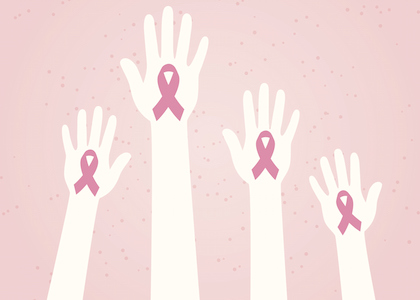
A Healthy Weight Helps Fight Breast Cancer
By Stacy Kennedy, MPH, RD, CSO, LDN; Reboot Nutritionist
In honor of Breast Cancer Awareness month, we will continue to post a relevant topic for you each week. If you missed last week’s post on going beyond pink and feeding your body with a rainbow of colors, click here.
This week we are highlighting the importance of maintaining a healthy weight for breast cancer prevention and for current and past breast cancer patients. Excess weight has emerged as a significant risk factor for breast cancer recurrence and increased risk for overall death. Being overweight after menopause increases a woman’s risk of developing breast cancer and women who are obese when diagnosed have a 17% higher risk of their cancer coming back and a 23% higher overall risk of death compared to women with a healthy weight at the time of diagnosis.
Healthy Eating for Prevention:
A new study from UC Davis shows that eating habits and weight management early in life can influence a woman’s risk of developing breast cancer through non-estrogen dependent pathways that have to do with the formation of mammary tissue. Encouraging healthy eating habits right from the start in our kids is important for their lifelong wellness. Consuming a plant-based diet including vegetables, nuts and legumes has been linked with a lower risk of breast cancer especially for estrogen receptor negative tumors. When coupled with a low intake of red meat, sodium and processed or refined carbohydrates this association was even stronger.
Weight Gain after Breast Cancer:
Surprising to many, weight gain – not weight loss- is common after diagnosis and treatment for most types of breast cancer. In fact, some studies show that a woman treated for the disease will gain the amount of body fat and lose muscle mass (called sarcopenia) in one year that would typically occur with aging over ten years. The reasons for weight gain during and after treatment vary and exist in a complex “perfect storm” of factors such as reduced physical activity, eating more comfort or carbohydrate foods to curb chemo-induced nausea, eating for coping, treatment induced menopause and other hormonal factors about the disease.
How you lose weight matters more than the number on the scale:
Being in the “optimal” weight range isn’t always a marker for success. In women who are overweight before or after treatment for breast cancer, losing 5-10% of their body weight can translate into a significant benefit of reduced recurrence and mortality risk. For example, in someone who is 5’6” and 200 pounds, getting down to 180 pounds can make a big difference despite 130-145 lbs technically being the healthy range.
Even more encouraging is that the act of eating at least 5 servings of fruits and vegetables and being physically active for 30 minutes at least 5 days or more a week can also help reduce recurrence risk, independent of weight loss. A study published in 2007 found that compared to the women who made no lifestyle changes, the group that combined fruits and vegetables with exercise faired best (no surprise!) The interesting part was that benefits were not 100% tied to their obesity status. Weight loss is often slow after treatment and the reduced recurrence and mortality risk was seen even before the women in this group lost weight. Eating a plant based diet and staying active can help promote weight loss but this study shows that the number on the scale isn’t the whole story.
Tips for healthy weight management:
- Eat breakfast everyday
- Bring your lunch more often than eating out
- Eat a variety of colorful fruits and vegetables with each meal and snack
- Be active everyday (walk, swim, bike, yoga, etc…)
- Limit high sugar, high sodium, high animal fat and refined or processed foods
Here are more tips for weight loss during your Reboot.